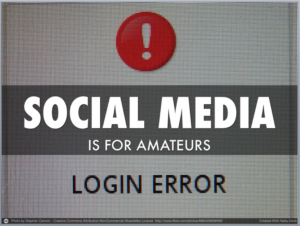 Yesterday I commented on the number one frustration I hear from the non-users of social media (that it’s all about what people had for lunch). Today we’ll tackle another popular attack from a few years ago: that social media is dominated by amateurs.
Yesterday I commented on the number one frustration I hear from the non-users of social media (that it’s all about what people had for lunch). Today we’ll tackle another popular attack from a few years ago: that social media is dominated by amateurs.
One of the most amazing things about social media is that it gives EVERYONE a voice. Unfortunately, that includes giving voice to a large number of people who don’t know what they’re talking about or have really stupid things to say. The critics have always been happy to point to this lame content as a reason for discounting the power of social media. It lowers the bar, letting all these amateurs in: just look at all the failed social media efforts (remember Google Wave?) and the long line of “next big things” that turned out to be small things. Interestingly, those people never seem to acknowledge that “Gilligan’s Island” was created by “professionals,” but no matter.
This one boils down to perspective. If you narrow your view, and focus on what is happening now and what happened before, then social media is going to upset you. It will create things that aren’t as good as what the professionals have been producing.
The same thing happened with the printing press, by the way. Once we figured out how to use that printing press, we found that people–ordinary people–were writing works of fiction and printing them on this new invention. This upset a lot of people at the time who simply KNEW, for a fact, that the only reason to have a printing press was to reproduce copies of the Bible or other classics that had been written centuries before. They didn’t have a word for these “new” stories, so they called them “novels” (as in, new stories).
But if you open up your perspective to this new wave of amateurs, you see some interesting things. Entirely new forms will be invented (maybe blogs are the new novels?). New ways of accomplishing old tasks will be invented. In short, what you get is innovation.
The reason for this (and the important leadership implication here) is that amateurs are really good at experimentation. Think about it, what have they got to lose–they’re amateurs! They can try new things, and if it doesn’t work, that’s fine. Professionals, on the other hand, are the experts. We expect them to be right. We expect them to already have the answer. And who runs all of our organizations today? Professionals. That means bad things for experimentation and innovation.
In truth, there is nothing preventing professionals from experimenting. It’s how we learn, and of course we expect professionals to learn. But when we narrow our focus, and turn towards the past, we lose sight of that fact, and we end up running organizations with a focus on answers, and not on learning. Experimenting takes a back seat, but, unfortunately, so does innovation.
So look at your organization. Where are you creating the space for experimentation? Are there containers within which it is okay to try new things? What about metrics? Do you actually keep track of your experiments and what you learned from them? Innovation doesn’t happen on its own, and while we still value your professional expertise, we need you (particularly you CEOs) to be open to experimenting and learning if we’re going to keep up with the pace of today’s change.
